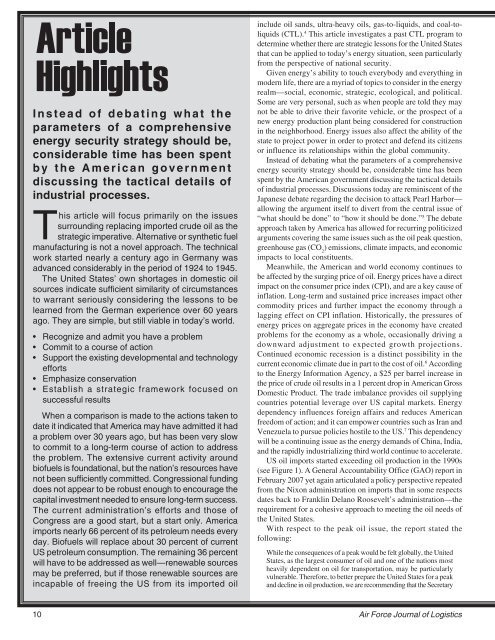Vol 32 No 4 - AF Logistics Management Agency
Vol 32 No 4 - AF Logistics Management Agency
Vol 32 No 4 - AF Logistics Management Agency
You also want an ePaper? Increase the reach of your titles
YUMPU automatically turns print PDFs into web optimized ePapers that Google loves.
Instead of debating what the<br />
parameters of a comprehensive<br />
energy security strategy should be,<br />
considerable time has been spent<br />
by the American government<br />
discussing the tactical details of<br />
industrial processes.<br />
This article will focus primarily on the issues<br />
surrounding replacing imported crude oil as the<br />
strategic imperative. Alternative or synthetic fuel<br />
manufacturing is not a novel approach. The technical<br />
work started nearly a century ago in Germany was<br />
advanced considerably in the period of 1924 to 1945.<br />
The United States’ own shortages in domestic oil<br />
sources indicate sufficient similarity of circumstances<br />
to warrant seriously considering the lessons to be<br />
learned from the German experience over 60 years<br />
ago. They are simple, but still viable in today’s world.<br />
10<br />
Recognize and admit you have a problem<br />
Commit to a course of action<br />
Support the existing developmental and technology<br />
efforts<br />
Emphasize conservation<br />
Establish a strategic framework focused on<br />
successful results<br />
When a comparison is made to the actions taken to<br />
date it indicated that America may have admitted it had<br />
a problem over 30 years ago, but has been very slow<br />
to commit to a long-term course of action to address<br />
the problem. The extensive current activity around<br />
biofuels is foundational, but the nation’s resources have<br />
not been sufficiently committed. Congressional funding<br />
does not appear to be robust enough to encourage the<br />
capital investment needed to ensure long-term success.<br />
The current administration’s efforts and those of<br />
Congress are a good start, but a start only. America<br />
imports nearly 66 percent of its petroleum needs every<br />
day. Biofuels will replace about 30 percent of current<br />
US petroleum consumption. The remaining 36 percent<br />
will have to be addressed as well—renewable sources<br />
may be preferred, but if those renewable sources are<br />
incapable of freeing the US from its imported oil<br />
include oil sands, ultra-heavy oils, gas-to-liquids, and coal-toliquids<br />
(CTL). 4 This article investigates a past CTL program to<br />
determine whether there are strategic lessons for the United States<br />
that can be applied to today’s energy situation, seen particularly<br />
from the perspective of national security.<br />
Given energy’s ability to touch everybody and everything in<br />
modern life, there are a myriad of topics to consider in the energy<br />
realm—social, economic, strategic, ecological, and political.<br />
Some are very personal, such as when people are told they may<br />
not be able to drive their favorite vehicle, or the prospect of a<br />
new energy production plant being considered for construction<br />
in the neighborhood. Energy issues also affect the ability of the<br />
state to project power in order to protect and defend its citizens<br />
or influence its relationships within the global community.<br />
Instead of debating what the parameters of a comprehensive<br />
energy security strategy should be, considerable time has been<br />
spent by the American government discussing the tactical details<br />
of industrial processes. Discussions today are reminiscent of the<br />
Japanese debate regarding the decision to attack Pearl Harbor—<br />
allowing the argument itself to divert from the central issue of<br />
“what should be done” to “how it should be done.” 5 The debate<br />
approach taken by America has allowed for recurring politicized<br />
arguments covering the same issues such as the oil peak question,<br />
greenhouse gas (CO 2 ) emissions, climate impacts, and economic<br />
impacts to local constituents.<br />
Meanwhile, the American and world economy continues to<br />
be affected by the surging price of oil. Energy prices have a direct<br />
impact on the consumer price index (CPI), and are a key cause of<br />
inflation. Long-term and sustained price increases impact other<br />
commodity prices and further impact the economy through a<br />
lagging effect on CPI inflation. Historically, the pressures of<br />
energy prices on aggregate prices in the economy have created<br />
problems for the economy as a whole, occasionally driving a<br />
downward adjustment to expected growth projections.<br />
Continued economic recession is a distinct possibility in the<br />
current economic climate due in part to the cost of oil. 6 According<br />
to the Energy Information <strong>Agency</strong>, a $25 per barrel increase in<br />
the price of crude oil results in a 1 percent drop in American Gross<br />
Domestic Product. The trade imbalance provides oil supplying<br />
countries potential leverage over US capital markets. Energy<br />
dependency influences foreign affairs and reduces American<br />
freedom of action; and it can empower countries such as Iran and<br />
Venezuela to pursue policies hostile to the US. 7 This dependency<br />
will be a continuing issue as the energy demands of China, India,<br />
and the rapidly industrializing third world continue to accelerate.<br />
US oil imports started exceeding oil production in the 1990s<br />
(see Figure 1). A General Accountability Office (GAO) report in<br />
February 2007 yet again articulated a policy perspective repeated<br />
from the Nixon administration on imports that in some respects<br />
dates back to Franklin Delano Roosevelt’s administration—the<br />
requirement for a cohesive approach to meeting the oil needs of<br />
the United States.<br />
With respect to the peak oil issue, the report stated the<br />
following:<br />
While the consequences of a peak would be felt globally, the United<br />
States, as the largest consumer of oil and one of the nations most<br />
heavily dependent on oil for transportation, may be particularly<br />
vulnerable. Therefore, to better prepare the United States for a peak<br />
and decline in oil production, we are recommending that the Secretary<br />
Air Force Journal of <strong>Logistics</strong>





